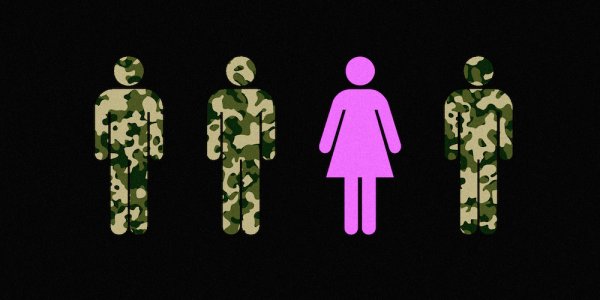

“Stolen valor.”
“Women should not be writing articles about the military.”
“I would love to see a few veteran journalists. This Sarah woman has written too many opinionated articles with NO military experience.”
“Another moronic post from that dumb bitch Sarah Sicard.”
These are a small selection of the lovely, constructive criticism that has graced the comment sections of my articles and email inbox since I started working for Task & Purpose. Terrible, right?
But I’ve been here a year and a half, and it’s not because I’m a masochist. I actually love this job.
March 8 is International Women’s Day, a United Nations-inspired holiday to celebrate the contributions of women to the workplace and open a dialogue about gender equality. Speaking as a fledgling female military journalist, I am honored to join women like Hope Hodge Seck, Oriana Pawlyk, and Tara Copp, who publish thoughtful, hard-hitting articles about issues that matter — powerful veterans stories, national security policy, and the culture of war — especially in light of a certain Marine Corps nude photo scandal that proves sexism is alive and well in the space we cover.
I also want to take this opportunity to say thank you to all the readers who take the time to write or say cruel, vile, or blatantly sexist things to me and about me, because comments like these make me a much better military journalist.
I grew up in Norfolk, Virginia, with a Navy pilot dad, surrounded by warships at the Little Creek naval base. Almost all of my friends as a kid came from military families. I’ve been on more tiger cruises than Carnival Cruises, and my first job after college was working as a defense reporter in Washington, D.C. When I got offered the job, I thought writing for Task & Purpose would feel like home, but I learned very quickly how hostile home can actually be.
I know I am not a veteran. This job doesn’t make me feel like I’ve seen combat. I’m not trying to steal any valor. And it’s damn near impossible to forget how much of a civilian I am while working on a staff stacked with male Marines, but just in case I do, I can always trust that the readers will remind me.
Because I never served, I worried every day of my first year at Task & Purpose about trying to make my writing seem credible. Every story I published was painstakingly researched and expertly sourced, and I would pore over the details with violent scrutiny because I couldn’t afford to make a mistake or misspell a word — not ever. The readers were looking for any sign of weakness, and I simply refused to give anyone the satisfaction.
While my counterparts — mostly male veterans — are penning beautiful vignettes about piss bottles and trench foot, I am still struggling to find my own voice in this space. The guys get to come into work every day and be themselves, and I have to put on another persona in order to survive our audience. That means on video, I need to be tougher; online, I need to be funnier; outside, my reporting needs to be stronger; and to survive every week, my skin needs to be 10 times thicker.
When I started working on this article, I asked a few women reporters about their experiences in this space. Susan Katz Keating, from the mercenary magazine Soldier of Fortune, was kind enough to reach out to tell me that the longer you stay in the field, the more you learn to brush off chauvinism. “At Soldier of Fortune, the accepted me as an anomaly outlier, and we all got along just fine,” she said. “I have been called a bimbo. That doesn’t bother me. I don’t take it personally, and I don’t have time to worry about it.”
Of course, she doesn’t have time. She’s been too busy — writing about prisoners of war in Vietnam, observing as the military plotted theoretical invasions, and touring the country in her Jeep while seeking out stories yet to be told — to care what any man thinks of her.
I used to get upset reading through the comments, feeling like I didn’t belong on staff at Task & Purpose. But I don’t give a shit anymore. I learned to own the fact that even the most harmless story I write is going to receive a barrage of criticism from people who think they know better or will discredit me as soon as they read my byline … like that time I wrote an article in support of Defense Secretary James Mattis, but was told that I am not qualified to shine his shoes, much less type his name into a Google Doc.
Now, readers’ disdain for me is a joke among the staff, one that I can laugh at too. Once I accepted this as the nature of the game, I stopped worrying about the readers and started writing stories that matter to me and the people like me: military family members, civilians who love the military, and people who actually influence national security policy.
That’s it. That’s what we, the female military reporters, are doing.
I know I don’t speak for women like Keating or Seck, but I love this beat. Covering the military as a female journalist isn’t easy, but it’s worthwhile. I care deeply about veterans and service members; I’m fascinated by national security issues; and military gear and technology have always been more interesting to me than lipstick and high heels. That’s why I took this job, and the harsh criticism is only making me better at it.
Those habits I developed out of fear of fucking up — the double and triple checking — have strengthened my reporting, and I hope to continue to improve the longer I stick around. So by all means, bring on the comments.